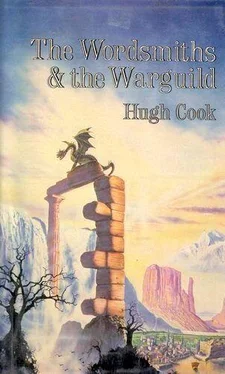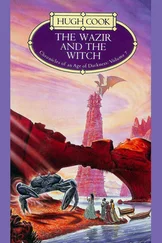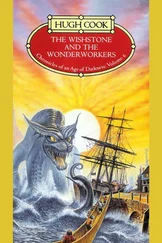Hugh Cook - The Wordsmiths and the Warguild
Здесь есть возможность читать онлайн «Hugh Cook - The Wordsmiths and the Warguild» весь текст электронной книги совершенно бесплатно (целиком полную версию без сокращений). В некоторых случаях можно слушать аудио, скачать через торрент в формате fb2 и присутствует краткое содержание. Жанр: Фэнтези, на английском языке. Описание произведения, (предисловие) а так же отзывы посетителей доступны на портале библиотеки ЛибКат.
- Название:The Wordsmiths and the Warguild
- Автор:
- Жанр:
- Год:неизвестен
- ISBN:нет данных
- Рейтинг книги:4 / 5. Голосов: 1
-
Избранное:Добавить в избранное
- Отзывы:
-
Ваша оценка:
- 80
- 1
- 2
- 3
- 4
- 5
The Wordsmiths and the Warguild: краткое содержание, описание и аннотация
Предлагаем к чтению аннотацию, описание, краткое содержание или предисловие (зависит от того, что написал сам автор книги «The Wordsmiths and the Warguild»). Если вы не нашли необходимую информацию о книге — напишите в комментариях, мы постараемся отыскать её.
The Wordsmiths and the Warguild — читать онлайн бесплатно полную книгу (весь текст) целиком
Ниже представлен текст книги, разбитый по страницам. Система сохранения места последней прочитанной страницы, позволяет с удобством читать онлайн бесплатно книгу «The Wordsmiths and the Warguild», без необходимости каждый раз заново искать на чём Вы остановились. Поставьте закладку, и сможете в любой момент перейти на страницу, на которой закончили чтение.
Интервал:
Закладка:
Togura, with the stranger dead, stood up.
The stranger started to stir – he was not dead at all. Togura tried to finish him off, but the women restrained him. Since the would-be assassin was not dead, they would have the pleasure of skinning him alive.
The next day, terrible things happened to the captive. In public. He clung stubbornly to life; he was not a pretty sight by the time he died. Togura watched it all, without emotion. He had seen worse. The body lay in state while everyone filed past to give the corpse a good hearty kick, which helped tenderise the meat; Togura gave it the hardest kick of all. The corpse was then demolished; some small boys began a tug of war with the intestines, while the women sizzled chunks of flesh on a barbecue.
"Togura!" said the headman, when the first steaks were cooked.
At first, Togura did not realise he was being addressed, for the headman's hare lip made the name slurred and distorted. Every time Togura heard the headman speak, he was reminded of Slerma, who also used to have a strange, slurred voice; he still had occasional nightmares about her.
"Togura!" said the headman, again.
This time, Togura realised who was being spoken to. He got such a shock that he almost jumped out of his skin. He advanced, with some hesitation. The headman embraced him, then presented him with a prime piece of rump steak. He was flattered. He ate heartily. Excellent! But this was not the end of his reward, for, after several long speeches, all the unmarried women of the village formed a line. The headman thumped Togura on the chest, then indicated the women.
Slowly, he began to understand.
A miraculous future revealed itself.
By triumphing over the assassin, he had saved the headman's life; he had proved himself as a man and as a warrior. He was going to be allowed to marry into the tribe. He would have weapons and a horse. Riding off to battle with the other men, he would prove himself as a great war leader. In time, he would become chief, an honoured patriarch revered at home, and feared abroad for his cunning, his sagacity, his reckless violence on the field of battle.
He looked the women over. He could see which ones fancied themselves – those who were tallest and widest. Well, bugger that for a joke! There was no way he was going to get himself hitched to a woman he couldn't beat up if it came to the crunch. There was only one choice for him, and he kenw it. He picked Namaji.
Incredulous laughter greeted his choice. The headman laughed until tears of mirth came blubbering down his cheeks. Little boys rolled about on the ground, chortling, kicking their heels as if they were being strangled. Togura dearly wished to have a go at a few of them. Namaji, embarrassed beyond endurance, broke down and cried. Togura confronted her bravely.
Finally the headman recovered hyimself, and made a short speech which set the people stamping and cheering. Namaji managed a small smile, and Togura knew everything was going to be all right.
The marriage took place the next day. The ceremony started at dawn and ended at sunset. There was a lot of singing, dancing and eating; Togura, for once, took no part in the music-making. During the ceremony, a horse was tortured to death as part of the festivities. Togura couldn't help noticing that it was a rather old horse, which had been lame to start with. He felt slightly insulted by this, feeling that he deserved the best.
At sunset, all the men escorted Togura and Namaji to a hut which had been made ready for them. He found himself trembling as he closed the door on the outside world.
"Namaji."
"Togura."
They found each other in the darkness. Togura, his hands shaking, laid rough hands on Namaji. In his haste, he stripped her more swiftly than he should have; he heard a little rip as fabric gave. Urgently, he grappled with her, sliding a hand straight to her privacy, and finding -
Togura screamed.
"No no no no!" he shouted.
Outside the hut, there was a chorus of cruel, knowing laughter. The men were out there. They knew! And what they knew was that his "she" was a "he." Namaji touched Togura with small, gentle, seducing hands. He slapped them away. Namaji wept.
"Togura," said Namaji, pleading.
"No," said Togura. "It's no good. I don't want a make-belief woman. I want the real thing."
He desperately wanted, needed, lusted for the real thing, so he could rut it under, taking what other men wanted, thus proving his strength, sagacity, wisdom, superiority and manhood. His ego lusted for status as much as his body lusted for the flesh.
He opened the door to the night, finding the men without. Gleefully, they bundled him back inside. He slammed the door on them, and swore.
"Togura?" said Namaji, tremulously.
"No!" roared Togura. "No! Forget it!"
He threw himself down in a corner and lay there, sulking. When Namaji lay down beside him, he did not have the heart to push her away. Nevertheless, he lay there stiffly, rejecting her with silence. She touched him again.
"Namaji," said Togura, removing her hand. "It wouldn't work."
"Togura?" she said hopefully, not understanding his Galish.
"No," he said. And then, using the local word: "Kal."
Understanding, she began to cry again. And Togura felt ashamed with himself, and sorry for her, and, at the same time, disgusted by her, and hated himself for being so narrow and cruel as to be disgusted, and felt bitter, angry and outraged at being forced into a position where he had – he felt this strongly – just had to be narrow and cruel to be true to himself. And -
But there is no need to elaborate. Suffice to say that he felt very mixed up, his emotions flickering like a chameleon trapped in a kaleidoscope, making his mind an agony of confusion.
He should be loyal to Namaji. But she had tricked him, so he shouldn't be. But maybe she thought he knew all along. And, after all, a warm body was a warm body. But nobody else in the village wanted this body! But he had known that all along. But he had not know why. But -
"Sod it sod it sod it," said Togura, biting his arm viciously, trying to relieve his agony by hurting himself.
And he started to weep.
Outside the hut, the men started to sing a loud, vigorous song which was probably obscene; maybe they had made it up especially to mock him. He wished he could kill them all. Kill them and castrate them. Rape their women one by one and burn their village down to nothing.
Why were people so vicious?
Why was life so cruel?
"Why was I ever born?" said Togura.
Whatever the reason for his birth, he was sure he was not fulfilling it by lying in a mud hut weeping for the amusement of a bunch of jabbering savages. As his sorrow began to ease, it was replaced by a fierce, furious determination.
"Live free or die," said Togura.
And he started making a hole in the roof.
Chapter 31
When Togura finally punched through to the starlight, he heard men outside, talking in low voices, their conversation punctuated occasionally by laughter. Supposing that they would eventually get bored and go away, he waited. Namaji, exhausted by emotional trauma, fell asleep, snoring loudly. Waiting in the darkness, Togura did mental revision, working through all the ways he knew of killing people. He concluded, with regret, that his repertoire was rather limited.
He heard some men saying their goodbyes, and, after that, no voices, no laughter. He enlarged the hole, then hauled himself out onto the roof and dropped down into the darkness. He stood there, listening. He heard insects cricketing away, frogs croaking in the distance, a few muffled snores, and, far away, a horse neighing. It was a dark, cold night, lit by starlight; there was, as yet, no moon. He could have wished for some wind; the night was very still.
Читать дальшеИнтервал:
Закладка:
Похожие книги на «The Wordsmiths and the Warguild»
Представляем Вашему вниманию похожие книги на «The Wordsmiths and the Warguild» списком для выбора. Мы отобрали схожую по названию и смыслу литературу в надежде предоставить читателям больше вариантов отыскать новые, интересные, ещё непрочитанные произведения.
Обсуждение, отзывы о книге «The Wordsmiths and the Warguild» и просто собственные мнения читателей. Оставьте ваши комментарии, напишите, что Вы думаете о произведении, его смысле или главных героях. Укажите что конкретно понравилось, а что нет, и почему Вы так считаете.












